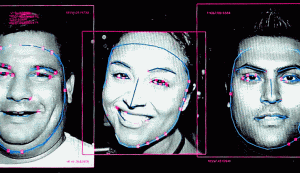Lee Chan

Facial recognition is a method used to identify a human face using biometrics to map facial features through technology imaging and compares it to the database of known faces. This technology is widely used in identification verification as a security measures and in social media such as snapchat filters. In order to use this technology, the algorithms must be fed with hundred of thousand of images, mostly from the internet, and categorized them by age, gender, skin tone, and other metrics for AI to better identify and improve. Million of people pictures are used without consent to power this technology. In January, IBM released a collection of photos taken from Flickr with annotated details including facial geometry and skin tone to researchers as a training set for further improvement towards reducing biases in facial recognition algorithms. Yet, none of the people had any idea of their images being used. Greg Peverill-Conti, a Boston-based public relations executive claims that it’s a little sketchy that IBM can use these pictures without any consent. IBM claims that its dataset is designed to help academic researchers improve on the technology so it can develop a “fairer” facial recognition systems accurately identifying people of all races, ages, and genders. Yet, legal experts and civil rights advocates are concern about such AI training and facial recognition improvement, particularity for minorities who could be profiled and targeted, such as immigrants or participants in political protest if used by government or law enforcement agency. Thus, is facial recognition in the hand of law enforcement good or bad?
Source 1: https://www.nbcnews.com/tech/internet/facial-recognition-s-dirty-little-secret-millions-online-photos-scraped-n981921
Interesting post Lee, never really thought about how we could utilize facial recognition for law enforcement since we are so used to using it for silly or simple things. Additionally, I am pretty surprised that IBM was allowed to use these pictures without consent. I assume it has been covered in the terms of use that Flickr could sell them or something along those lines. Personally, I am a little concerned about a government body being able to recognize your face and the potential of them being able to track you via city cameras as a result, thanks to the book 1984 that has dystopia written all over it. I understand how it can be extremely helpful in stopping crimes or even preventing them, but at the same time, this feels like it would be a violation of privacy. One question I have is how would the government be able to utilize this without a database of pictures of people? Obviously, we have drivers licenses and passports but for those who don’t have either of those, specifically, such as immigrants as mentioned in your post.
This is an interesting post and I can definitely see how the government and law enforcement can use the technology for the goods of society. A better facial recognition system will allow the police to correctly identify people who committed crimes. It will also allow the government to track high-profile criminals and terrorists to ensure public safety. However, at the same time, I can also see how dangerous this technology can be when fallen into the wrong hand. An unethical government could definitely use this technology to separate and discriminate a certain group of people.
I think advanced facial recognition could be a great help to solving crimes in the future. Being able to pick up and identify someone’s face from a security or traffic camera could be a big help in identifying criminals. I understand that it might make people uncomfortable that the government can identify people anywhere, but at the same time this means more criminals will be kept off the streets. As long as you are obeying the law, the advanced facial recognition should not impact you negatively.
I believe technology like this isn’t bad , in fact it seems amazing. What bothers me is obviously the multiple ways that it can be used that people will take advantage of. As Drew Holt above me stated it would be great for solving crimes , but like Lee stated “particularity for minorities who could be profiled and targeted, such as immigrants or participants in political protest” it can be used to make people targets just for expressing their freedom of speech. There is a lot of pros and cons of technology like this because its one of those things that inevitably will be developed and used in all of those ways, good and bad. This just begs the question is technology like this worth it. Should there be rules and regulations to tech like this ? If so who should keep track of it?
I think this technology can definitely save law enforcement a lot of time and money in finding criminals and solving crimes; therefore, it could help make the world a safer place. I think I put making the world a better place above my own need for “privacy”. Which I don’t really feel is being personally invaded by this technology. As long as I’m not committing any crime, I’m sure law enforcement doesn’t care what I’m doing, so I’m sure they won’t pay any attention to me. If I am committing a crime, then they should be paying attention to me, and I don’t deserve any privacy. As for IBM using the pictures of people without consent; on one hand, I would at least like to know if my pictures are going to be used for something and know what that something is. However, on the other hand, posting pictures on the internet basically gives everyone on the internet access to them and I think people should be aware of the by now. If you want true privacy, stay away from social media.